#Denis Rousseau
Explore tagged Tumblr posts
Text
Laval - L’art s’invite dans l’espace publicitaire pour une 5e édition (CA)
Un monde en soi, 2015 Aquarelle et collage sur papier / Caroline Boileau Du 22 septembre au 13 octobre La Ville de Laval convie les citoyens et les citoyennes à découvrir une promenade urbaine singulière dans les stations de métro de la Concorde, Cartier et Montmorency et dans les rues à proximité de cette dernière. Le parcours artistique sera accessible du 22 septembre au 13 octobre, dans le…
#Bertrand Carrière#Caroline Boileau#Catherine Bolduc#Denis Rousseau#Eveline Boulva#Fiona Annis#Flavia Alexandra Novac#Francis Macchiagodena#Geneviève Goyer-Ouimette#Hédy Gobaa#Hubert Reeves#Josiane Lanthier#Journées de la culture#Laval - L’art s’invite dans l’espace publicitaire pour une 5e édition (CA)#Longueuil#Marie-Claude Bouthillier#Marie-Jeanne Musiol#Paryse Martin#Paumé arts et littératures#Rick Leong#Simon Bertrand#Ville de laval#Yann Pocreau#Yannick De Serre#Zoom Art
0 notes
Text










CODWWII Text Meme
There are barely CODWWII meme + I have spare time at work + I need to post this now so I can repost it to our small CODWWII community so.... there you have it!
#call of duty#cod#cod mw2#cod wwii#cod ww2#cod meme#text meme#robert zussman#ronald red daniels#frank aiello#william pierson#drew stiles#arthur crowley#Camille “Rousseau” Denis#commander davis#cod world war 2#world war ii#world war 2#red daniels#ronald daniels#call of duty world war2#call of duty world war 2
102 notes
·
View notes
Text
I left tags on a post saying something like this but I wanted to talk about it some more….
If only Danielle had lived to see Sayid’s fate. To see him become ‘sick’. ‘Infected’. How poetic it is that the first person she saw and confided in in 16 years ultimately befell the same fate as her loved ones whom she had to kill for her own survival, the last people she had talked in those 16 years before she captured Sayid.
Do you think she would have been able to shoot him? I think she would, but would she hesitate? The way she hesitated with Robert? Or would she entirely give up fighting, seeing that her first sign of pure life and hope in 16 years had, too, succumbed?
#Danielle and that sickness….#it’s so interesting how the infection/sickness is up for interpretation#because the show kind of implies that they were never sick and Danielle killed them#out of paranoia or something#but you can’t deny that Robert tried to shoot his pregnant wife#sayid’s transformation at the end of his life kind of proves at least to me that the ‘sickness’ she saw in her colleagues was real#being willing to kill without feeling#like Robert tried to#idk#I believe something did happen and her colleagues were actually ‘sick’ in some way#but it’s also beautifully tragic if they really were not and she just was so paranoid she deluded herself into killing them#lost#ABC lost#lost abc#lost show#lost tv show#Danielle Rousseau#sayid jarrah#Robert Rousseau
47 notes
·
View notes
Text
"I am born to love you and to cause you annoyance."
- D. Diderot in a letter to J. Rousseau (Packet A, No. 52)
From the same letter Rousseau almost thrown in a fire :(
Fyi, I have marked the passage with a sticky note that now reads 'forever in awe of the writing style of 1700s M/M letters' and 'some JJ/DD cause I'm not God's strongest soldier'
#JJ is always trying so hard to make Diderot look like a snake but he always ends up coming across as a genuinely great guy in Confessions#tw: jj#rousseau#jean jacques rousseau#confessions#denis diderot#diderot#age of enlightenment#1700s#18th century#history memes#men of letters#philosophy#philosophy memes#enlightenment#queer history#potentially#in my heart at least
81 notes
·
View notes
Text
Calling some history fans who also enjoy the enlightenment…. I am but a humble AP Euro student who had fallen dangerously in love with sooo many philosophers from the enlightenment era, but especially Voltaire (and whatever was going on with him and Frederick the Great), Wollstonecraft, Rousseau, and Diderot.
If anyone would be interested in recommending me good books to read about these guys OR good sources to just better understand them… oh. Oh I am so open and begging.
Uhmmm I would like to note that while I do enjoy dissecting shortened versions of their work,, I fear I could not sit through 250+ pages of their writing. If u know good dissections of their work however 👀👀👀👀
THANK YOUUU seriously THANK YOU SM
#enlightenment#history#ap euro#voltaire#mary wollstonecraft#denis diderot#rousseau#frederick ii#frederick the great#book recommendations#book recs#all help appreciated :)
27 notes
·
View notes
Text
Today I learned Rousseau composed music and even heard one of his work on the clavecin !!!!
In a music + theater adaptation of Diderot's Le neveu de Rameau with Nicolas Vaude (who played Robespierre in Les Visiteurs: la révolution) as said neveu
It was delightful, Vaude as such charming charisma and energy Les Visiteurs wasted his talent !!
18 notes
·
View notes
Text
bir mektubunda insanlar arasındaki yalnızlığın çöldeki yalnızlıktan daha acımasız olduğunu ileri sürüyordu.
lars svendsen - yalnızlığın felsefesi
#lars svendsen#yalnızlığın felsefesi#felsefe blog#stoa felsefesi#1844 felsefe el yazmaları#karl marks#yabancılaşma#charles bukowski#denis diderot#rousseau#dante alighieri#bertolt brecht#milan kundera#franz kafka#bilge karasu#küçük prens#kitap#edebiyat#blogger#felsefe#kitaplar#blog#kitap kurdu#şiir#friedrich nietzsche#böyle buyurdu zerdüşt#kürk mantolu madonna#charles baudelaire#sokrates#platon
23 notes
·
View notes
Text
#Aristotle#Lesbian love#western concepts of love#denis de rougemont#jean jacques rousseau#Katarina Majerhold
3 notes
·
View notes
Text
Right?😅 1700s philosophers with access to modern technology/social media is a concept that is somehow both delightful and terrifying
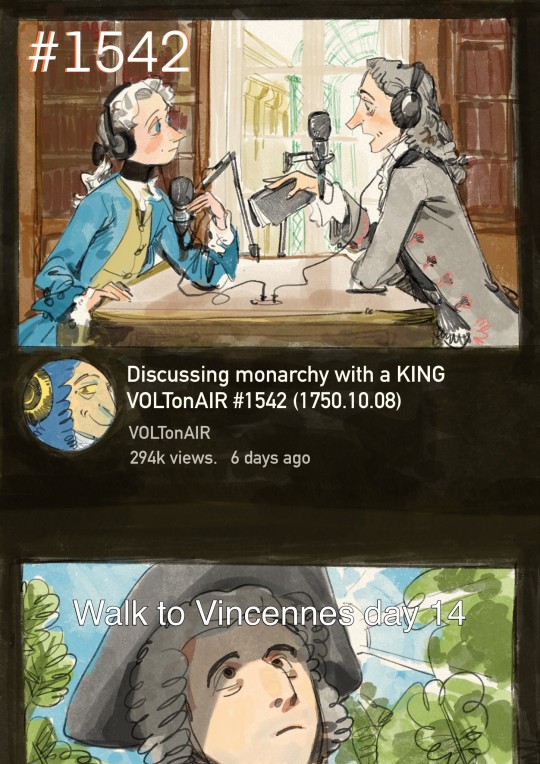
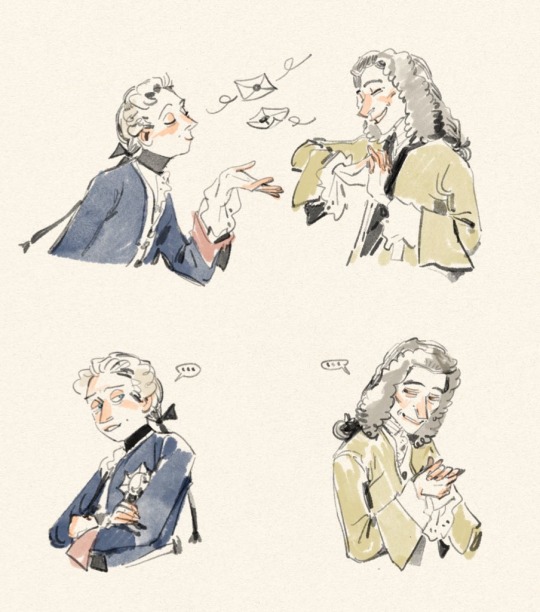

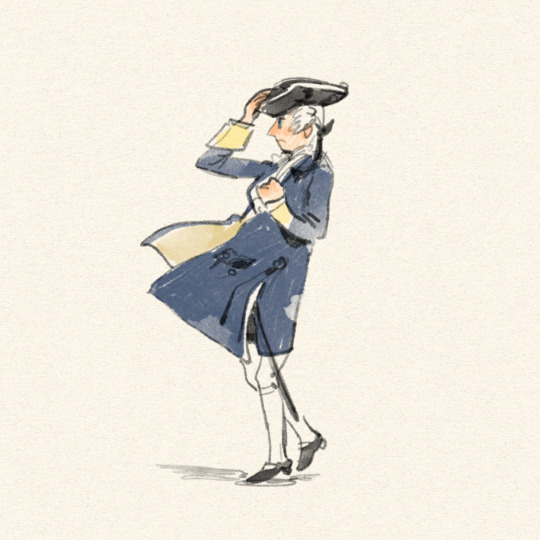
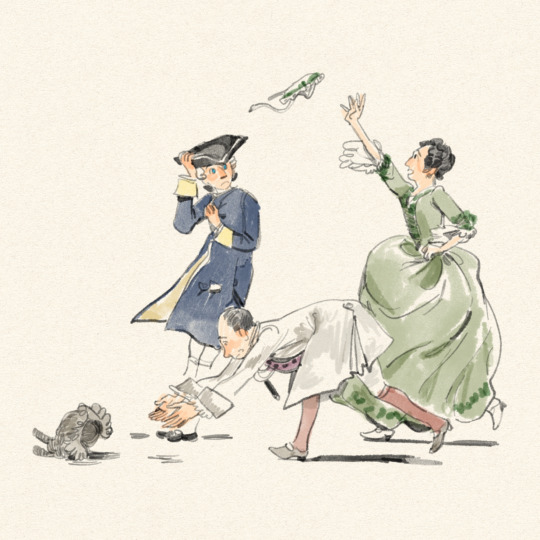
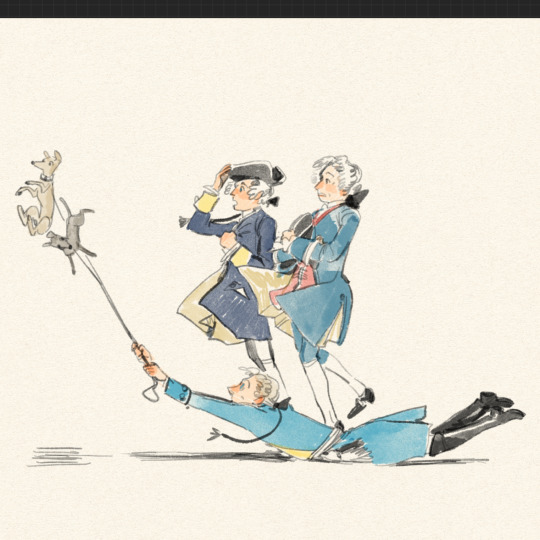
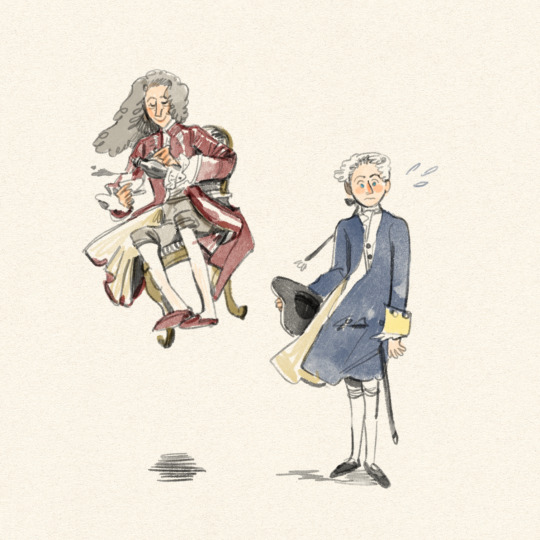

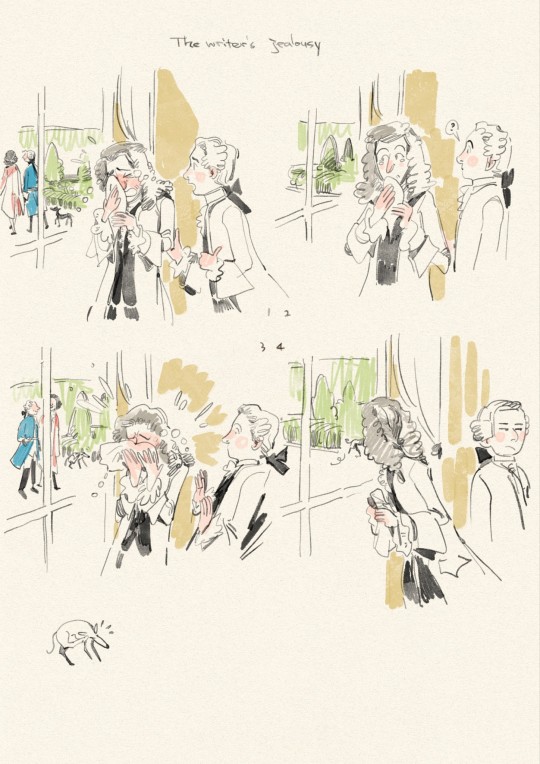
potsdamania
#voltaire#1700s#philosophy#history shitposting#jean jacques rousseau#denis diderot#& others#age of enlightenment
533 notes
·
View notes
Text
~Requests♡~
{<- masterlist}

18+
Smut ~ Violence ~ Fluff ~ Angst

Birthday Lessons {5k} ♡♡ {Elijah x Kol x Reader} --- On your birthday night at Rousseau's, tension fills the air as Kol and Elijah compete for your attention, promising a celebration like no other.
Je t'aime, Je t'adore {3k} ♡♡ --- You and Elijah are enjoying your honeymoon in the south of France, doing what newlyweds do best.
Dinner can wait {2k} ♡ --- Elijah is nervous about you returning home after a trip, so he cooks dinner to calm himself.
Cold Truth {5k} ♡♡ --- You and Klaus are on a mission to turn Elijah's humanity switch back on. The only problem is that you are the reason he turned it off in the first place.
Gentle {3k} ♡♡ --- As movie night with Elijah gets heated, you voice your insecurities and he dispels your fears.
Eyes for you {4k} ♡♡♡ --- Amidst the clinking of glasses and strained smiles, you find yourself feeling jealous of the way Hayley is interacting with your husband... Until he shows you exactly why you shouldn't be feeling that way.
Elijah's Love Letters {2.5k} ♡ --- NSFW Alphabet
Klaus's Love Letters {3k} ♡ --- NSFW Alphabet
Always {3k} ♡♡♡ --- Upon your unexpected appearance at the compound, centuries after being presumed dead, Elijah has to grapple with feelings he long buried and the consequences that come with it.
Between Pages {5k} ♡ --- It's the 1960s, and you are a college student finding solace in the campus library. There, you encounter more than knowledge within its walls.
What did you wish for? {2k} ♡♡ --- On your birthday, Elijah and Rebekah find themselves at odds when it comes to organizing the party.
Tied {2.7k} ♡ --- After days apart, you've crafted the perfect surprise for Elijah to welcome him home.
Reminder {4.5k} ♡♡♡ --- Your relationship with Elijah feels like its unravelling with the arrival of Hayley and a cutting nickname from Klaus. Fortunately, Elijah knows just what to do to make you feel loved.
Strings {6.2k} ♡♡♡ --- You've denied what your heart wants for so long and Elijah is tired of waiting.
Whine {5k} ♡♡ --- You make the mistake of testing Elijah's patience and he puts you in your place.
Devotion {7.7k} ♡♡ --- When you find out you are pregnant you are afraid of how Elijah will react. His anxieties around fatherhood get the best of him and he gives in to his darker impulses.
Crush {6.7k} ♡♡♡ --- You have quite the crush on Rebekah's big brother, and you find yourself lost in the tangled web of unreciprocated feelings, yearning for a love that may never be yours.
Forgiveness {5.5k} ♡♡♡ --- After a tragic event you flip your humanity switch and begin to terrorize the Quarter. You have to be put down for the good of the city, but your husband will stop at nothing to save you.
Stubborn {4.1k} ♡♡ --- You and Elijah get into a fight about his protective nature. He thinks you are too stubborn, and you think he's too controlling. How will you resolve your issues?
Ménage à Quatre {5.3k} ♡ {Elijah x Klaus x Rebekah x Reader} --- Just a quick little ménage à quatre with Rebekah & the boys...
Change {5.8k} ♡♡♡ --- Your marriage causes you to feel trapped and worthless. Until you meet a handsome stranger at a café and he shows you how much more you can be.
Touch {5.6k} ♡♡♡ --- After a dinner party with the Mikaelson family, you try to get Elijah to open up his heart to you.
Teach You {3.6k} ♡♡ --- You are nervous about your first time with Elijah and he makes it an unforgettable experience.
Perfect {2.8k} {he/him pronouns} ♡♡ --- After a date with Elijah, you want to take things to the next level and he makes you feel like the only boy in the world.
Piano Lessons {2.4k} ♡ --- You come home after a long day at work and Elijah helps you unwind with a song.
Misbehavior {8.2k} ♡♡♡♡ --- Elijah Mikaelson is controlling, arrogant and absolutely infuriating, you don't know how anybody can stand him. That is... until he gets you in his bed.
Fantasies {4.8k} ♡ --- You get Elijah to open up about his desires and he discovers a few of yours, leading to a night of fun and exploration.
Worth the wait {7.1k} ♡♡♡ --- You and Elijah are childhood friends, dipping in and out of each others lives for the past one thousand years. You hope that one day you will have a chance to be together and find the love you've always longed for.
Magnificent {8.8k} ♡ {Elijah x Klaus x Kol x Reader} --- Just a quick little ménage à quatre with Elijah, Kol and Klaus... on spring break...
Hold {4.9k} ♡♡ --- You are having drinks with Elijah and you want to tell him about your little problem, in hopes that he will help you with it.
Paperwork {5k} ♡♡ --- You approach a handsome philanthropist at a charity gala, leading to a stress-relieving meeting high above the city lights.
Princess {5.1k} ♡ --- You and Elijah have a night of kinky fun.
Safe {8.2k} ♡♡♡♡ --- In a world where trust is hard to come by, you've learned to keep your guard up, especially around men. But when Elijah enters your life, he's determined to break through your defenses, venturing into a realm of passion, pain, and the search for something real.
Madness {6.4k} ♡♡ --- You bring a date to the Mikaelson party, specifically to attract the attention of your estranged husband. The plan backfires; he's not the type to let you go so easily and makes sure to remind you that no one will ever take his place.
Soft {3.4k} ♡♡ --- You've been dating Elijah for a while, but your insecurities keep you from taking things further. But one night, Elijah finally gets the chance to show you how much he loves your curves.
Forever {6.8k} ♡♡♡ --- Elijah loves you with all his heart, but his commitment to his family and his loyalty to Klaus keeps him from acting on his feelings. But when he almost loses you, he is determined to prove that you are the only woman he has ever truly loved, and wants to make you his, forever.
Three Lessons {6.2k} ♡ --- Elijah finds you in transition and teaches you a few lessons on how to be a vampire.
Control {6k} ♡♡♡ --- Plagued by nightmares of hurting you, Elijah avoids any form of intimacy, but you have had enough. You confront him about his rejection and Elijah finally learns how to let go and lose control.
Wishes {3.1k} {Haylijah} ♡♡♡ --- A smutty extended version of haylijah's first time together.
Respect {2.9k} {Delijah} ♡ --- Elijah puts Damon in his place, and demands he show him a little more than respect.
Cat and Mouse {5.3k} ♡ --- It's your anniversary party, but you are terribly bored, and the one person you actually want to be around isn't playing fair.
Decadence {5.9k} ♡ --- Elijah meets an intriguing woman at the opera, leading to an evening of music, wine and vampiric indulgences.
Bindings {4.9k} ♡ --- You ask Davina for help with creating something to tie up Elijah... only for you to get in way over your head. Luckily, he is in a forgiving mood.
Family Man {4.5k} ♡♡ --- Life at the compound can be chaotic with kids and family running around, but Elijah wouldn't have it any other way.
Gratitude {4.7k} ♡♡ --- It's a warm summer night and Elijah plans a special date for you, hoping to make your dreams come true.
Something Sweet {5.5k} ♡♡ --- It's the day of your wedding, a day you've dreamed about since you were young. Everything is exactly as you imagined it would be, except one thing. Today is not only the day of your wedding, today is also the day you die... And you never wanted anything so badly.
Perfect Messes {5.6k} ♡♡♡ --- After a difficult relationship that left you struggling to rebuild your life, you reconnect with an old friend who helps you rediscover what true love feels like.
Bloodier Bath {2.7k} ♡♡ --- Aunt Flo comes to visit and the noble Elijah once again stands up to the bitch.
Insatiable {3.9k} ♡ --- You are at the club with the Mikaelsons, and your husband Elijah gets a little jealous when someone else hits on you.
Ice Cream and Love Bites {8.2k} ♡♡ --- You are at a playground with your son when you meet Elijah. He is everything you are looking for in a partner, but his life is shrouded in mystery. Can you trust him with your heart?
Please Sir {4.2k} ♡ --- You meet Elijah on a dating app, needing his help to fulfill a fantasy, and he is happy to oblige.
Following Orders {2.7k} ♡ --- You decide to reverse the roles for a day, tying Elijah up and having your way with him...
Springs {2.7k} ♡ {Viking!Elijah} --- You meet your secret lover deep in the woods, and take him to your favorite spot to spend some time together.
Captive {7.1k} ♡♡♡♡ {Elijah x Klaus x Vampire!Reader} --- You are being held captive by a group of nasty witches, being tortured, starved of blood and interrogated night and day... You've lost all hope, until two old enemies show up to save you, and you spend the evening reminiscing and making up for lost time.
Solstice {9k} ♡♡ {Viking!Elijah} --- In a small Viking village, love blooms as Elijah steals your heart. But a winter storm prevents your future plans, forcing secrets to surface and your bond to grow stronger than ever.
Belonging {8.8k} ♡♡♡♡ --- You needed a roommate, and he needed a place to belong...but as secrets unravel and his dark past comes to light, your new housemate might just change your life forever..
Yearning {9k} ♡♡ --- Hired by Rebekah to paint her family’s portrait, you find yourself irresistibly drawn to her eldest brother, Elijah. But with a husband bound by ambition and society’s stifling expectations, surrendering to forbidden desire could change your life forever...
Cedar {3.6k} ♡♡ --- What begins as a night of unrestrained passion shifts when Elijah takes things too far, and he makes sure to show you just how deeply he cares for you in the aftermath...
Adore {3.5k} ♡ --- When Elijah catches you lost in a steamy novel, he’s determined to turn fiction into reality...
Inevitable {6.9k} ♡♡ --- A playful night of banter leads to Elijah's siblings setting him up on a dating app, but the only match he wants is you...
Chaos {7.8k} ♡♡♡ --- A punk-themed night out with the Mikaelsons reveals a side of Elijah you’ve never seen before... and a chance to push boundaries neither of you ever expected.
Anchor {672 wrds} ♡ --- Grief threatens to overwhelm you, but Elijah's calming presence becomes your anchor, reminding you that even in your darkest hours, you are not alone.
Snow Day {6.2k} ♡♡ --- A rare snowstorm blankets New Orleans, and the Mikaelsons revel in the icy chaos. But as Klaus pushes Elijah to confront his feelings for you, the heat between you two threatens to outshine the storm.
Serendipitous {8.4k} ♡♡♡ {Elijah x Klaus x Reader} --- When your new life in New Orleans collides with the past you tried to outrun, you come face to face with the man you never stopped thinking about. And worse? You are sleeping with his brother.
Angel {5k} ♡♡♡ --- Newly turned and overwhelmed, one hunger refuses to be ignored. You need guidance, and who better to teach you than Elijah Mikaelson?
Polaroids {4.8k} ♡♡ --- Hidden in his suits, tucked in his ties. Each scandalous polaroid Elijah finds drives him closer to the edge… until he finally snaps.
Dissolve {4.6k} ♡♡ --- Elijah always puts your pleasure first, never letting himself fully let go. Until you push him over the edge and he falls completely.
Fur-ever {3k} ♡ --- Elijah Mikaelson: Original vampire, refined gentleman, luxurious cat tree.
For Safety Reasons {6k} ♡♡♡ --- A dark legend. A looming threat. And Kol Mikaelson offering a very unconventional solution.
Reverence {6.2k} ♡♡♡♡ --- Elijah protects you from a stranger’s insult, then shows you why it was never true...
Bliss {9.2k} ♡♡♡ --- It’s the day after your third child is born… and the best day of Elijah’s immortal life.

#the originals#lissa responds#lissas masterlist#elijah mikaelson#kol mikaelson#Rebekah Mikaelson#klaus mikaelson#lissas requests#elijah mikealson smut#elijah mikaelson smut#the vampire diaries#tvdu#ao3#fan fiction#elijah mikaelson masterlist#masterlist#tvd#klaus mikaelson x reader#klaus mikaelson smut#kol mikaelson x reader#rebekah mikaelson x reader#poly mikaelsons
453 notes
·
View notes
Text
Happy 7th Anniversary Call of Duty World War II!!

One of my favorite campaigns ever.
Have a glimpse of Stiles’ photo wall! I imagine he sometimes took candids and portraits of the people he met along the way.





There are more but for now... that'll do.
#call of duty#cod#call of duty ww2#cod ww2#cod wwii#zussman#robert zussman#ronald red daniels#drew stiles#ronald daniels#frank aiello#arthur crowley#commander davis#Camille Rousseau Denis#Vivian Harris#william pierson#joseph turner#red daniels#zussman cod#pierson cod#world war 2#ww2#fan art#artists on tumblr#drawings#fanart#andrew stiles#glendy lucast#cod ww ii fanart
20 notes
·
View notes
Text
The Romanticism of One Piece V: Personal Freedom, The Idealized Child, and Monkey D Luffy
AO3 Part I Part IV
“God will not have his work be made manifest by cowards” —Ralph Waldo Emerson
In chapter 507, Oda writes his thesis for the entire series when he has Luffy state that the Pirate King is the freest man on the sea. It’s a simple statement said simply, as if it were the most obvious thing in the world, but it completely recontextualizes everything that’s come before it while setting the stage for everything to follow.
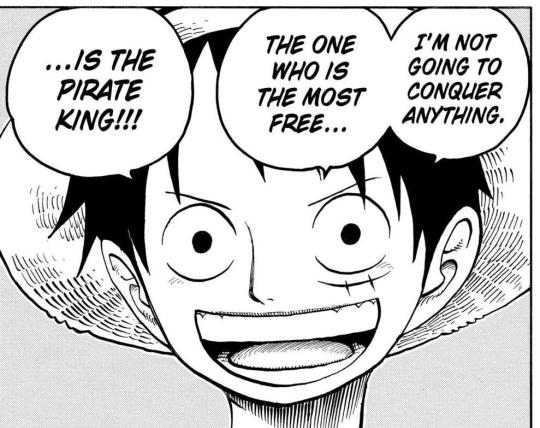
When making a close analysis of this entire scene, you’ll notice that Rayleigh spends much of the conversation not directly looking at the Straw Hats. He’s physically turned away from the people he’s talking to, and the framing Oda uses often puts an added layer of distance between the two parties.
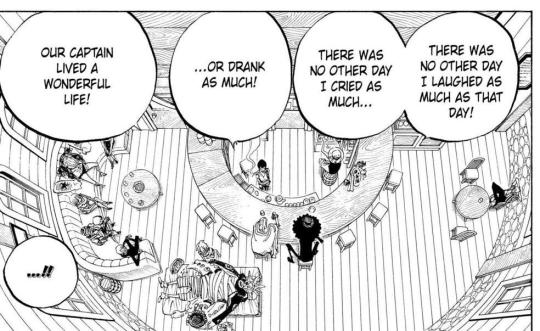
It’s only when Luffy refuses to hear the secrets of the One Piece in favor of having his own adventure that Rayleigh turns around. He looks Luffy in the eye, and…he smiles. Rayleigh had already agreed to help coat the Straw Hat’s ship, but you get the impression that in this moment Luffy’s passed some sort of test, that Rayleigh finally sees in Luffy the same potential Shanks did all those years ago.
It’s impossible to say if this is the reason Rayleigh came out of hiding to save the Straw Hats later in the arc, but there’s no denying that he went above and beyond to ensure Luffy was strong enough to make it through the New World. After all, there’s no reason for him to spend two years training Luffy if he wasn’t rooting for him to become King.
It’s scenes like this that make Luffy a deceptively difficult character to write about. On the surface he seems like the perfect shonen archetype: simpleminded, glutinous, with a vague enough end goal to support a long-running manga series. But it’s as you dig into the specifics that he becomes increasingly difficult to define.
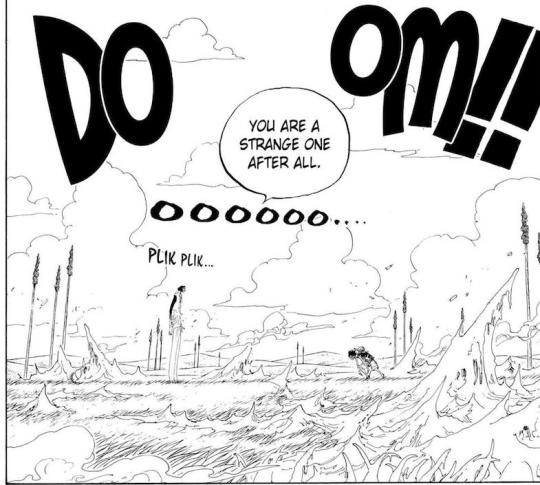
One reason for this is that Luffy remains amazingly consistent as a character over the course of the series. He is both the unstoppable force and the immovable object. He will not be denied once he sets his mind on something and remains unshakably sure in his own convictions. He starts the manga fully convinced in what he believes a pirate to be, spending much of the East Blue saga beating up rival pirate captains for not living up to his exacting standards. While he does go through character development, it is less a change in personality than a refinement of what was already there, like burning away the dross from a precious metal. By becoming a better leader and captain he becomes a better pirate, and at heart, Luffy has always been a pirate.
I’ve already mentioned the importance of Jean Jacques Rousseau’s The Social Contract to the Romantic movement, but he wrote a second work that was just as influential. In Emil, or Concerning Education, Rousseau lays out his theory of childhood education. He was very concerned with maintaining that which was natural, starting with the infant remaining unrestrained by the binding chains of swaddling clothes and continuing through adolescence with Robinson Crusoe as the only book his imagined student ever studies.
By the age of 15 his student would have learned nothing of history or ethics or metaphysics. In Rousseau’s own words, “You are probably alarmed at the number of subjects I have brought to his notice. You are afraid I will overwhelm his mind with all this knowledge. But I teach him rather not to know them than to know them” (emphasis mine).
It was during the Romantic era that childhood began to be understood at its own separate stage of development, rather than seeing children as very small adults. A veneration bloomed for the innocence of childhood, similar to the myth of the noble savage that was equally popular at this time.
My favorite example of this idea of childhood innocence I stumbled across in my reading was Percy Bysshe Shelly’s strange and unfinished poem "A Vision of the Sea". The poem rather gruesomely depicts a ship ravaged by a terrible storm that’s killed everyone on board except a mother and her small child. There are also a pair of tigers that fight a bunch of sea monsters to the death, but that’s mostly unrelated to the point here.
Shelly describes the child of the poem—again, surrounded on all sides by death and destruction—like this
She clasps a bright child on her upgathered knee; It laughs at the lightning, it mocks the mixed thunder Of the air and the sea, with desire and with wonder It is beckoning the tigers to rise and come near, It would play with those eyes where the radiance of fear Is outshining the meteors; its bosom beats high, The heart-fire of pleasure has kindled its eye,
The mother bemoans their fate and tells the child not to smile. She recognizes that death is near, understands the hopelessness of their situation. She mourns. But the child, still innocent and pure, just wants to play with the tigers.
Is there anything more Luffy-like than that?
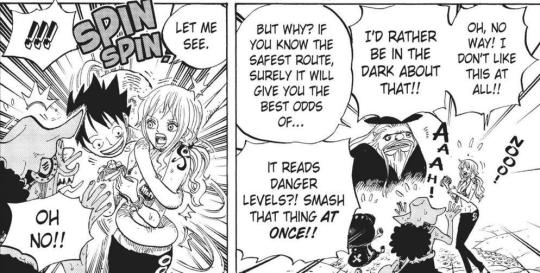

Oda has said in multiple interviews, most recently when talking with Iñaki Godoy when he visited the set for season 2 of the live action, that he writes Luffy as an idealized child. He recognizes that as people enter society they lose personal freedom in exchange for social responsibility, so he created a character that truly has the freedom to do whatever he wants.
youtube
But for as childlike as Luffy can be, he isn’t actually a child. He bears enormous responsibility as captain of the Straw Hat Pirates. But it’s a responsibility of his own choosing, because he wants to, and it’s not something that’s been forced on him by the world. Luffy’s continued rejection of his Grand Fleet shows how he eschews any attempts to add any additional responsibility he does not want.
To the Romantics, society and civilization were seen as corrupting forces, so anything that stood apart was by default pure. The solution was to be found in nature and the natural. After all, Adam and Eve only fell after eating of the Tree of Knowledge of Good and Evil. If one could separate themselves from this knowledge, they, too, could enjoy paradise.
This idea would eventually snake through Europe, developing as it went, until it landed on American shores, and in the 1830s the Transcendental movement began in the United States. It marked the first true American philosophy, and overlaps with American Romanticism. The central tenant is a focus on self-reliance and an inherent distrust of institutions, which they saw as corrupting of the spirit.
One of these early Transcendentalists was Henry David Thoreau, who famously spent two years living alone in the woods as a sort of experiment, building his own house and growing his own food, stretching the limits of his own self-reliance. His experience would become the basis for the book Walden It’s here he muses on a great many subjects, and was preoccupied with the artifice of modern society.
To Thoreau, too much stock was put into material things, with countless people working jobs they hated to support a living that the world told them was required before they could be accepted. The same man was judged completely differently depending on whether he’s dressed well or poor, or the size of their house, or by working a socially acceptable job. People enslaved themselves to the ever-changing whims of modernity and denied themselves the satisfaction of living exactly as they pleased. To quote Ralph Waldo Emerson, Thoreau’s close friend and fellow Transcendentalist, “To be yourself in a world that is constantly trying to make you something else is the greatest accomplishment”. And to quote Emperio Ivankov when explaining how they managed to carve out a slice of paradise amidst the hells of Impel Down, “We have our freedom”.
Neither the veneration of childhood nor the self-reliance of the transcendentalists match exactly with what’s presented in One Piece, but in Luffy there’s an interesting mix between the two. While Luffy makes his reliance on his crew clear, he is beholden to no one but himself. He maintains a child-like innocence and wonder all throughout the series, but unlike many characters who follow this template, he isn’t naive.

Luffy has a unique ability to cut through bullshit. He relies on instinct and follows his heart above all else. During Alabasta when Vivi was worrying herself into knots over the enormity of the coming civil war, he maintained a laser focus on the root of the problem: Crocodile. For most of us, as we grow up our vision is clouded by the outside interests of the rich and the powerful. We get so tripped up trying to make our way through the complexities of modern life that we lose sight of what’s truly important. We worry in equal measures over the past and the future, and in doing so miss out on the beauty of the present. Contrast that to a character like Luffy, who is so committed to the present that no future scheme survives contact with his whims, and who remains so unconcerned about his past that he had no idea that he had a father.
Thoreau makes it clear that he spent two years living in the woods because he wanted to. During the early chapters of the book he says outright that he didn’t want or expect others to follow his path, but to find fulfillment in their own way. For some, this can be seen as selfish, and to an extent Thoreau agreed. He, for example, said he didn’t believe in giving to charity. To him, it was better not to give than to give out of some kind of obligation.
Likewise, Rousseau recognized the child’s ability to turn self-love into selfishness as they grow into adolescence, and took great pains in describing how he would instruct his imaginary student in pursuing his own happiness without infringing on the happiness of others, by having him empathize with even the lowest parts of society.
Selfishness in One Piece is often treated positively, and is one of the key traits that makes a good pirate. In order to chase one’s dreams without abandon, you have to be willing to shove everything else aside. It’s why characters like Yassopp and Olvia are never condemned by the narrative for abandoning their families, and is even the crux of the entire Baratie arc while Sanji struggles to find his “spear of spirit”.

One of the most commonly sited examples of Luffy’s self-centered morality comes in Impel Down. He doesn’t free the prisoners or team up with character like Crocodile out of some moral outrage for the despicable conditions of the prison or because of the inhumane torture of his fellow man. He just wants to save his brother. If he could have reached Ace without setting off a riot he would have, and wouldn’t have felt guilty about leaving the rest behind.
A more interesting example, I think, comes from Luffy allowing Robin onto the crew after Alabasta. It’s easy to forget that Robin at this time had just finished helping Crocodile orchestrate a civil war. The artificially-created drought displaced and killed untold numbers of people. Innocent people, who had personally done her no wrong. While Robin had no intention of giving Crocodile the in-universe equivalent of a nuke, her plans put Vivi and other people Luffy cared about at enormous risk.
And yet, he says she isn't a bad person. Why?

Well, Luffy’s selfish. He doesn’t judge people by their clothes or their work or if they help start civil wars. Robin personally saved his life twice, and for him, that was enough.
The secret that makes Luffy work as a character is that his selfishness is often exerted in the service of others. During the post-Marineford flashback Luffy makes it very clear that he’s ultimately motivated by the desire to not be alone. Similar to what’s described in book IV of Emile, he’s experienced suffering and takes great pains to avoid feeling that way ever again. He’s very quick to recognize others who are hurting and is willing to fight on their behalf.
Nothing else matters. Luffy’s willing to work with psychotic criminals like Bege if it means saving Sanji. He’s willing to team up with Crocodile if it means saving Ace. He’ll declare war on the World Government for Robin and take on the biggest bounty in the East Blue to save Nami. Luffy lives a life without regret, and in doing so does the sort of things that readers bound by the constraints of society only wish they could.
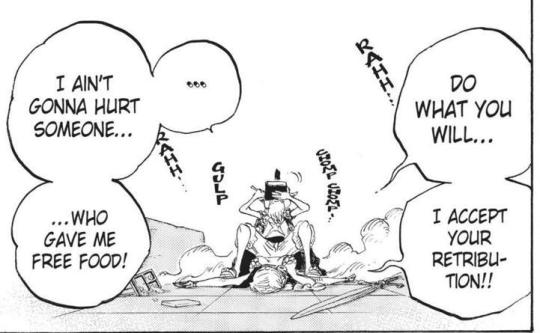
Luffy doesn't fight in pursuit of systemic change. He’s not a Revolutionary. He helps the gladiators of the Colosseum not because he recognizes the horrors they experience under Doflamingo’s rule but because they gave him food. And he expects to be judged in the same way, not caring how the citizens of Fishman Island look at him, but leting them come to their own conclusions based on what they see. Yet systematic change follows wherever he goes, the chaotic, disrupting force of Luffy’s personality refusing to kowtow to any of the great powers of the world.
This brand of selfishness would be terrifying if Luffy were not so quick to make friends. In searching for his own liberation he ends up liberating others by complete accident. At the same time, the characters who catch Luffy’s attention are the characters who fight for themselves, even if they aren’t strong enough to win without his help. This is seen from the very earliest chapters in the series, when Luffy only intervenes on Coby’s behalf after the latter insults Alvida, or how the Straw Hats only help Usopp fight off Kuro because he’s first willing to protect his village. Even the Revolutionary Army is only interested in helping those who are willing to pick up arms, making this a theme that transcends the pirate-focused narrative. The overwhelming force of nature that is Luffy empowering rather than conquering as he pursues his own ultimate freedom.
With this in mind, it comes as no surprise that the original Joyboy was the first pirate, or that Luffy is his successor. The character of Joyboy seems to be based on Caribbean myth brought over by West African slaves, and is a figure of dance, joy, and chaos, uniting people via celebration. It’s no accident that every big arc ends with a party and that people are brought together by their ability to genuinely laugh and be happy.

(Credits for this go to this reddit thread. Sadly sources on the real world Joyboy myth seem to be sparse)
While the ultimate significance of Joyboy and the nature of Luffy’s devil fruit have yet to be revealed, Luffy is no stranger to fighting against in-universe religious powers while ultimately taking the form of a god himself. It’s important, I think, that Oda portrays religious beliefs fairly neutrally up until the point where they cause human suffering. Skypiea remains a theocracy even at the end of the arc. The destruction of the spirit tree grove of the Shandians is treated with utmost seriousness. Dorry and Broggy fighting because of their belief in the god Elbaf is one of Usopp’s main inspirations throughout the series. And yet in both a literal and figurative sense, Luffy is God’s natural enemy.

Because at the end of the day no one, not even God, should stand in the way of progress and liberation. For Luffy, he finds that freedom in his adventures across incredible and impossible lands. This is something that would have resonated with the Romantics of old, as they often found God not in dark, dusty churches, but in nature, and their pursuit of the sublime.
145 notes
·
View notes
Text
Kinda losing my mind over the yassified French Philosopher stickers I've found on Redbubble...


Diderot, JJ, but especially this incredible high-femme serving Voltaire:

#don't get me wrong the artist is clearly talented but?#what's going on there??#denis diderot#diderot#jean jacques rousseau#rousseau#voltaire#age of enlightenment#french history#philosophy#french philosophy#philosophy memes#1700s#frev#qu(o)eue vadis
83 notes
·
View notes
Text
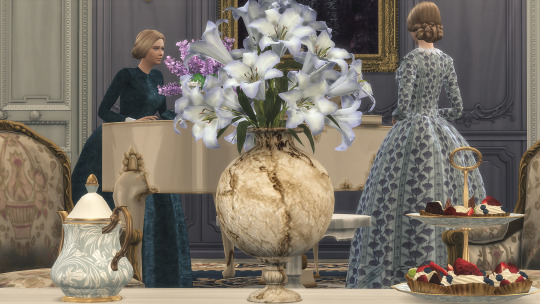
Château de Clèrisseau: 24 Mai 1850, 13:30
Duchesse de Clèrisseau: All I am trying to do is understand, Mignonne!

Duchesse de Clèrisseau: Not only have you rejected Oliver's invitation, but now you are refusing the proposal of le Vicomte? I've never been so unsettled by your actions as I was watching le Vicomte leave just now!

Mademoiselle Eleanor: A marriage with le Vicomte would never have worked, Maman.
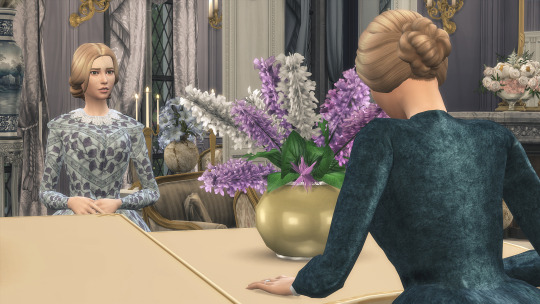
Duchesse de Clèrisseau: And Oliver? What of him?
Mademoiselle Eleanor: Maman, s'il vous plaît....
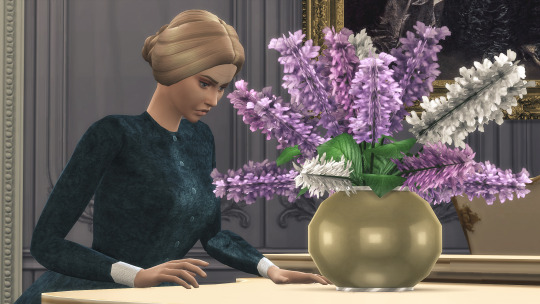
Duchesse de Clèrisseau: [Sighs] I wish you would tell me what's wrong, Mignonne. You have no idea what it is to watch you suffer so, to know where your feelings truly lie yet watch you work so diligently to deny yourself your own happiness!

Mademoiselle Eleanor: There's nothing to say, Maman. It is best to let the matter lie.
Duchesse de Clèrisseau: I cannot, Mignonne. Not when I-
Steward: Pardonnez-moi, Madame.
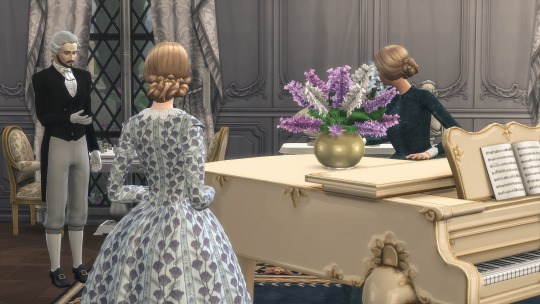
Duchesse de Clèrisseau: Oui?
Steward: A caller has arrived for Mademoiselle Valery.
Duchesse de Clèrisseau: Quoi?
Steward: A caller, Madame.
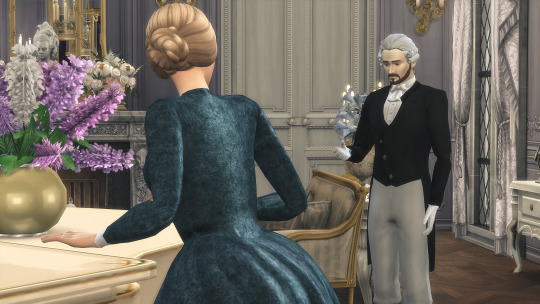
Duchesse de Clèrisseau: I see...Well, we shall welcome him, of course.
Steward: Oui, Madame. [Leaves]

Mademoiselle Eleanor: Maman, what are you doing?
Duchesse de Clèrisseau: If you cannot explain your reasonings behind rejecting two impeccable matches, than we have no choice but consider other suitors.

Mademoiselle Eleanor: Maman-
Steward: Monsieur le Marquis de Solomont.
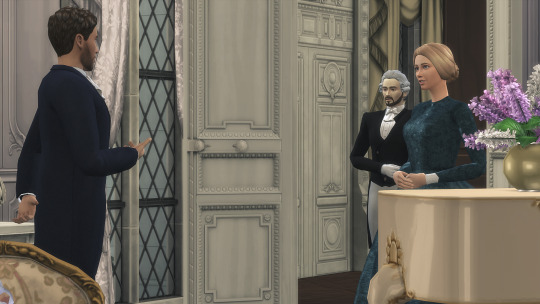
Duchesse de Clèrisseau: Monsieur de Rousseau! This is certainly a pleasant surprise, To what do we owe such a pleasure?
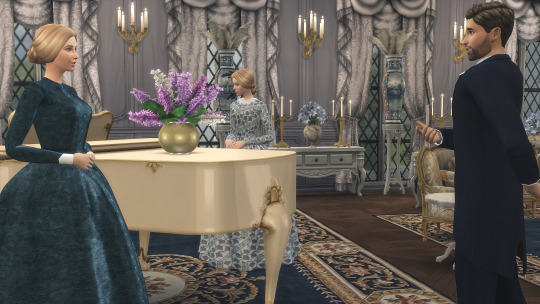
Marquis de Solomont: I believe the pleasure to be entirely mine, Madame. I trust you both are enjoying this fine afternoon?
Duchesse de Clèrisseau: En effet. You caught us just in time. We were just discussing plans to take a walk about the park.
Marquis de Solomont: Is that so? What a coincidence. I came to ask if Mademoiselle Valery would happen to fancy just that. Would it be too presumptious to intrude on your plans?

Mademoiselle Eleanor: Oh, I-
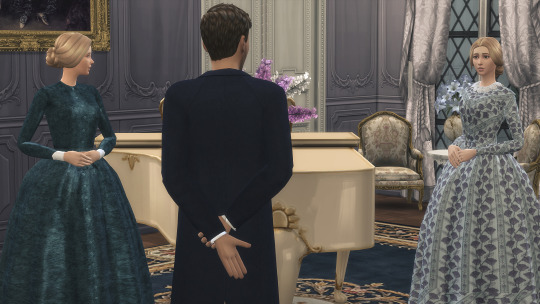
Duchesse de Clèrisseau: She would be honoured, I assure you.
Marquis de Solomont: Magnifique!
Duchesse de Clèrisseau: Shall we, then?
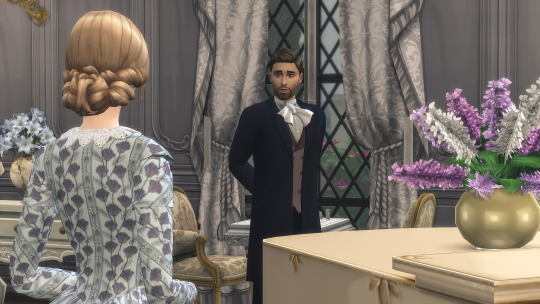
Marquis de Solomont: I have one more question to ask before we do, if you'll allow me? Just yesterday I heard you have yet to receive an invitation to tomorrow's Prix de Thornolie, and I wondered if you might accept mine?
Mademoiselle Eleanor: Oh...I suppose...you honour me, Monsieur.
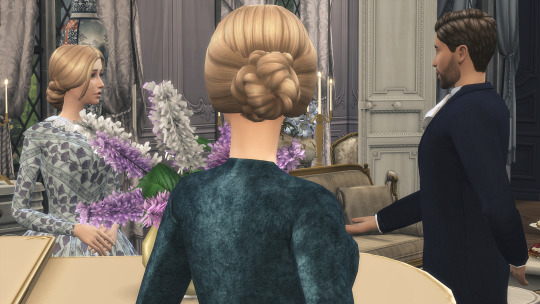
Marquis de Solomont: Splendide! You have truly brighten my spirits, Mademoiselle Valery.
Duchesse de Clèrisseau: Well...what a turn of events this is. Shall we all be off then?
Marquis de Solomont: En effet. Mademoiselle?
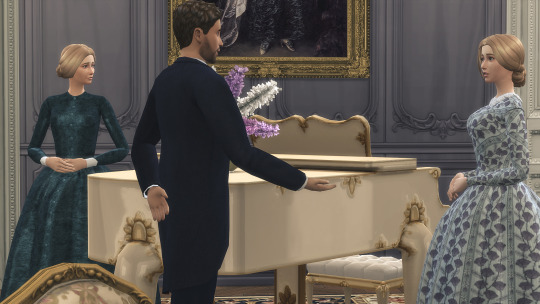
Previous | Beginning | Next
#thornolia chapter one#ts4#sims 4#historical sims#sims 4 historical#sims 4 royal#sims 4 royalty#sims 4 royal family#sims 4 royal simblr#ts4 historical#ts4 royal#ts4 royal family#ts4 royal simblr#thornolia#thornolia nobles#behind the scenes#Duchesse Charlotte Valery#Mlle Eleanor Valery#Marquis Pierre Rousseau#Victorian Sims
60 notes
·
View notes
Text
içerik olmaksızın düşünmeler boş. kavramlar olmaksızın öngörüler kör.
immanuel kant - fragmanlar
#kitap#edebiyat#blogger#felsefe#kitaplar#blog#kitap kurdu#friedrich nietzsche#immanuel kant#pratik aklın eleştirisi#rene descartes#spinoza#baruch spinoza#denis diderot#sokrates#platon#jean jacques rousseau
1 note
·
View note
Text
As used, the term ‘precolonial’ Africa and the distortions it represents cannot illuminate our understanding of Africa and its history. More importantly, it is wrong to think of colonialism as a non-African phenomenon that was only brought in from elsewhere and imposed on the continent. Africa has given rise to a rich tapestry of diverse colonialisms originating in different parts of the continent. How are we to understand them? For example, if ‘precolonial Morocco’ refers to the time before France colonised Morocco, it must deny that the 800-year Moorish colonisation of the Iberian Peninsula, much of present-day France and much of North Africa was a colonialism. For, if it were, then ‘colonial Morocco’ must predate ‘precolonial Morocco’. I do not know how any of this helps us understand the history of Morocco. Similarly, a ‘precolonial’ Egypt that refers to Egypt before modern European imperialism would also deny Mohammed Ali’s colonial adventures at the head of Egypt in southern Europe and Asia Minor. Was ancient Egypt part of some precolonial formation? That strains credulity. To conceive of the history of Africa and Africans in terms only, or primarily, of their relation to modern European empires disappears the history of Africans as colonisers of realms beyond the continent’s land borders, especially in Europe and Asia. It is bad enough that the term distorts the history of African states’ involvement in overseas provinces. It is worse that it misdescribes the evolution of different African polities over time. The deployment of ‘precolonial Africa’ is undergirded by a few implausible assumptions. We assume either that there were no previous forms of colonialism in the continent, or that they do not matter. We talk as if colonialism was brought to Africa by Europe, after the 1884-85 Berlin West Africa Conference. But it takes only a pause to discover that this is false. African history is replete with accounts of empires and kingdoms. By their nature, empires incorporate elements of colonisation in them. If this be granted, Africa must have had its fair share of colonisers and colonialists in its history. When, according to the mythohistory (the founding myth of the empire) of Mali, Sundiata gathered different nations, cultures, political leaders and others to form the empire in the mid-13th century, he did not first seek the consent of his subjects. It was in the aftermath of their being subdued by his superior force that he did what Jean-Jacques Rousseau in the 18th century insisted all rulers should do if their rule is to escape repeated challenges and last for an appreciable length of time: turn might into right. Ethiopia, another veritable empire, is a multinational, multilingual, multicultural state whose members were not willing parties to their original incorporation into the polity. Whether you think of the Oromo or the Somali, many of their successor states within Ethiopia are, as I write this, still conducting anticolonial struggles against the Ethiopian state.
146 notes
·
View notes